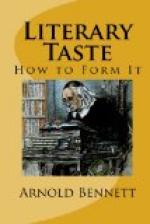You will find that, in classical literature, the style always follows the mood of the matter. Thus, Charles Lamb’s essay on Dream Children begins quite simply, in a calm, narrative manner, enlivened by a certain quippishness concerning the children. The style is grave when great-grandmother Field is the subject, and when the author passes to a rather elaborate impression of the picturesque old mansion it becomes as it were consciously beautiful. This beauty is intensified in the description of the still more beautiful garden. But the real dividing point of the essay occurs when Lamb approaches his elder brother. He unmistakably marks the point with the phrase: “Then, in somewhat a more heightened tone, I told how,” etc. Henceforward the style increases in fervour and in solemnity until the culmination of the essay is reached: “And while I stood gazing, both the children gradually grew fainter to my view, receding and still receding till nothing at last but two mournful features were seen in the uttermost distance, which, without speech, strangely impressed upon me the effects of speech....” Throughout, the style is governed by the matter. “Well,” you say, “of course it is. It couldn’t be otherwise. If it were otherwise it would be ridiculous. A man who made love as though he were preaching a sermon, or a man who preached a sermon as though he were teasing schoolboys, or a man who described a death as though he were describing a practical joke, must necessarily be either an ass or a lunatic.” Just so. You have put it in a nutshell. You have disposed of the problem of style so far as it can be disposed of.
But what do those people mean who say: “I read such and such an author for the beauty of his style alone”? Personally, I do not clearly know what they mean (and I have never been able to get them to explain), unless they mean that they read for the beauty of sound alone. When you read a book there are only three things of which you may be conscious: (1) The significance of the words, which is inseparably bound up with the thought. (2) The look of the printed words on the page—I do not suppose that anybody reads any author for the visual beauty of the words on the page. (3) The sound of the words, either actually uttered or imagined by the brain to be uttered. Now it is indubitable that words differ in beauty of sound. To my mind one of the most beautiful words in the English language is “pavement.” Enunciate it, study its sound, and see what you think. It is also indubitable that certain combinations of words have a more beautiful sound than certain other combinations. Thus Tennyson held that the most beautiful line he ever wrote was:




